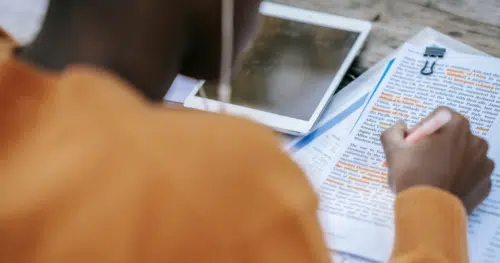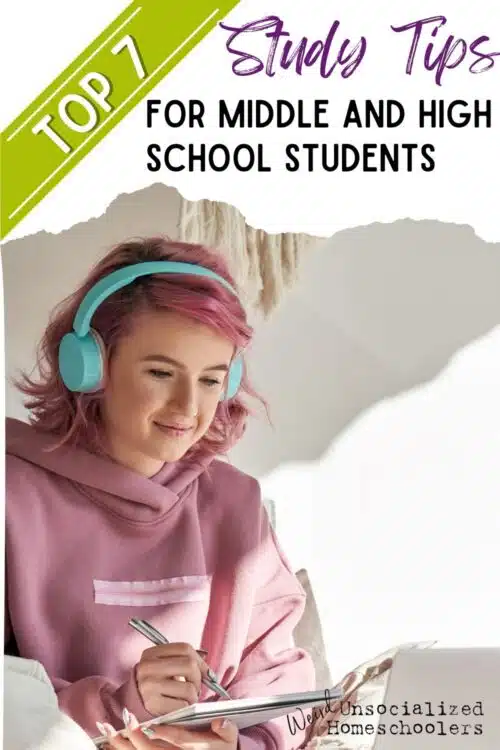Top 7 Study Tips for Middle School and High School Students
By the time your student reaches middle school, you should begin moving toward independent study time. Try these study tips for middle and high school students to help your teens develop strong independent learning skills.
One of the greatest challenges of transitioning from parent-guided to independent learning can be helping your teens develop strong study habits. That transition typically begins in middle school with the goal of having primarily self-directed learners by high school.

7 Easy Study Tips for Teens
Try these study tips to help your teens stay focused as they set their own schedule to complete their school work independently.
1. Find the Right Spot
First, help your student find his best study spot. For some kids, this may be the dining room table, where they have room to sit and spread out all their books. For others, it may be a desk in their room, the living room couch, or sprawled out on their bed. Even a porch swing or a reading blanket on the grass can be an ideal study spot in warm weather months.
The key factors of a good study spot include:
- Good lighting
- Space to write
- A comfortable chair that is the right height for writing or typing comfortably (sprawlers excluded)
- Access to supplies (pencils, paper, resource materials, a computer, etc.)
Some teens may work better within sight or hearing distance of other family members to keep them accountable. Others may need to be away from the distractions of siblings and other household activities.
If your student’s best study spot fluctuates (the porch swing on pretty days and the living room couch on others) or is in a spot without a designated work space, make sure that they have ready access to their supplies. Use a tote or storage box to make it easy to grab and go while also serving as a spot to stash supplies out of sight when they’re not in use.
2. Set the Mood
Next, you want to set the mood for studying. Some students (and adults) prefer quiet for working. Josh and I can work for a couple of hours in companionable silence at the dining room table.
Other students, like Megan, prefer listening to music while they study and complete schoolwork.
Letting Megan listen to music while doing schoolwork might drive me crazy if I didn’t know that many studies indicate that some people concentrate better with background noise. Granted, the music she listens to probably isn’t as conducive to learning as something like classical, but as long as she’s comprehending her schoolwork – and using headphones – I’ll live with it.

If you or your kids work better with a little background noise but find music distracting, check out Coffitivity. It’s a site that streams ambient white noise. Although I prefer quiet, I sometimes use Coffitivity to drown out other distracting sounds that come part and parcel with working from home.
Whether your student prefers a quiet study area or one with a little background noise, make sure the chosen spot fits the bill. Well, you know, as much as possible. Sometimes those of us who prefer quiet are out of luck in a busy household. I may or may not own a pair of noise-canceling headphones that I pull out when the noise level is destroying my ability to concentrate.
3. Teach Time Management
One of the most important skills your student will ever learn is effective time management. The ability to prioritize tasks and work without supervision are two skills that sometimes give homeschooled students an edge over their traditionally schooled peers in college.
By allowing our students to work at their own pace and choose how and when to work on individual subjects, they may go to college better prepared than students used to regular 55-60 minute blocks of instructional time.
We need to be purposeful in teaching these skills because this is one of those study tips that are learned behaviors. We found the Victus Study Skills System very helpful, but there are probably some things that you’re already doing to help your student develop good habits.
Some ways to teach time management skills include:
- Set and enforce due dates. We’re not doing our students any favors by not establishing consequences for unmet due dates.
- Teach your student to work backward from the due date to create a schedule. For example, show her that if a book needs to be completed four weeks from now, she can divide the number of pages by how many days she plans to read to determine a daily reading goal. (Bonus tip: We only schedule 4 days a week for reading so that there is a built-in catch-up day if we get behind.)
- Schedule time for studying. My kids have a space for “study hall” on their daily checklists.
As parents and educational facilitators, we need to be modeling excellent time management skills, too. Just saying.

4. Limit Distractions
It is so easy to get distracted when you’re doing something that is not at the top of the list of things you want to be doing. Even as an adult, I have trouble not getting distracted by electronics and even household chores. Sometimes, even unloading the dishwasher is preferable to whatever I’m supposed to be doing.
Try these study tips to limit distractions for our teens (or ourselves) include:
Don’t allow electronics during study times. I’m not as diligent about this as I should be. Most of the time, my kids are pretty good at self-regulating. In the past, I made them leave their phones with me until they had finished their schoolwork. They could check their devices during short breaks between subjects.
Block social media sites during school hours. In this day and age, this is one of the best study tips I can offer you. There are downloads and apps for blocking social media sites during times that you set up. StayFocused is a Chrome extension, Cold Turkey is a download, and Self Control is an app for Mac users.
You may also be able to set something up in Parental Controls, depending on your device or service provider.
Keep study spots clean. Many people are easily distracted by clutter. If your students are that way, it’s important for them to keep their study areas clean. Even if your kids think they can work amid the mess, too much clutter can hurt their productivity.
5. Try Checklists
We’ve found checklists to be very helpful in keeping everyone on track. It eliminates I-forgot-itis. And, I’m not just talking about the kids. I’m terrible about forgetting things without a list, too.
For school, we like the Basic Unlabeled Weekly one-page planner from DonnaYoung.org. I always add checkboxes to it because we all derive great satisfaction from checking boxes.
My kids know that they can do their schoolwork in any order and even work ahead in subjects or work in blocks (history on Tuesdays and Thursdays and science on Mondays and Wednesdays, for example) as long as they complete everything by the end of the week.
We also love the planners from A Plan in Place. I use the homeschool teacher planner and the kids like the student planners. I love the TickTick app on my phone for work or household reminders and to-do lists.
Some kids may prefer using work crates as a tracking method. While they are often used with younger students, Brianna found them beneficial all the way through high school.
6. Teach Note-Taking Skills
Because many of us grew so used to taking notes in high school and college, we may not think about how important it is to teach our teens note-taking skills. However, this is another of those study tips that we need to be intentional about making sure our teens have mastered.
Show your teens how to:
Use a highlighter. Demonstrate how to look for key phrases, words defined in the text, names, dates, and other key details to mark in their texts.

Make written notes. If they can’t write in their textbook or if they’re listening to a lecture, make sure your student knows how to use a notebook or notecards to take notes. Teach them to look or listen for repeated or emphasized words or phrases and how to use their own shorthand or drawings to jot down ideas quickly.
Discover how your student studies best. Help your teen figure out how to use his notes effectively. Everyone can benefit from rewriting their notes while the ideas are still fresh in their mind. Additionally, does your teen need to go over his notes with a study partner? Do drawings and diagrams based on the notes help? Would she benefit from a review site like Quizlet? Find out what study tips work best for your teen.
Encourage your student to practice his note-taking skills at church or co-op or while listening to podcasts or watching videos.
7. Check In Regularly
Finally, I have found it helpful to check in with my kids on a regular basis. Some homeschool families have a morning meeting during which mom or dad and students go over what was done the day before, what needs to be done during the current day, and any areas of struggle or concepts that may need to be clarified. This can also be a time to review what study tips are working and what might need to be tweaked.
I’ve found it helpful to peek in on my kids a time or two during the day. I do this at times when it’s easy for them to get off-track – within half an hour of getting started back after lunch (because sometimes it’s tough to get back to schoolwork) and in the late afternoon when they’ve been working hard for a while, and their concentration levels may be waning.
Sometimes just checking in and asking how they’re doing or if there is anything they need help with is enough to make sure everyone stays focused.
Now, if I could just get someone to check in on me and make sure I stay focused…
What study tips have you discovered that work well for your independent learners?
You Might Also Like
- Field Trip Ideas for Middle and High School Students
- Homeschool Like a Boss. Literally.
- 100 Hands-On Activities for Middle School and High School
- How to Graduate a Homeschooler
Kris Bales is a newly-retired homeschool mom and the quirky, Christ-following, painfully honest founder (and former owner) of Weird, Unsocialized Homeschoolers. She has a pretty serious addiction to sweet tea and Words with Friends. Kris and her husband of over 30 years are parents to three amazing homeschool grads. They share their home with three dogs, two cats, a ball python, a bearded dragon, and seven birds.








My oldest daughter is 11(5th grade) so we are just getting started with this. Reading is all she does independently at this point. She works best in the quiet of her room. Setting check-in points(after a certain # of pages) is very important. After she reads the assigned chapter/s of a book for school, I have her either orally narrate it or ask her questions about it to ensure understanding.
Love this article Kris! Having two teens and a tween boy… I completely agree! Thanks for sharing with the Hop… It is one of our featured articles this week! We appreciate all you do for the homeschool community!
Thanks, Trish!
Great stuff. Please keep the tips for homeschooling bigger kids coming!